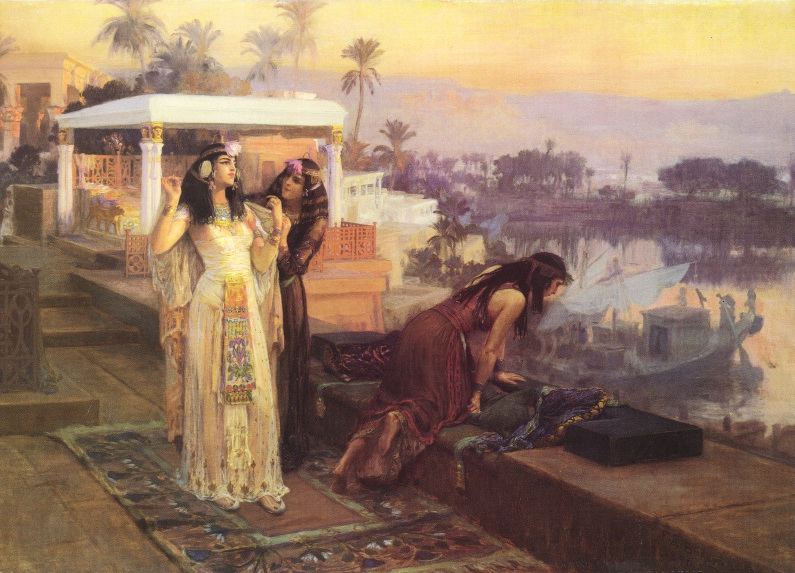Winner of the Fall 2017 StMU History Media Award for
Best Article in the Category of “Political History”
Everyone can recall the famous words “‘Till Death Do Us Part.” For most, such vows are given at the beginning of a marriage that anticipates a long and happy life together. However, in the case Cleopatra and Mark Antony, it was a completely different story. Their marriage was brief and they had far less time together than they most likely wanted to have.
From the very beginning, Cleopatra was smart, cunning, witty, and independent, and most of all she was a natural leader. She knew how to get things done, and as the Queen of Egypt, this was a crucial skill to have. She also knew what to do in order to gain what she wanted. Of course, when it came to Antony, it was no different. Antony was a Roman politician and general, and Cleopatra knew that she wanted him and she knew just how to get him.

Cleopatra and Antony met in 42 B.C.E., shortly after the death of Julius Caesar, who was also a former lover of Cleopatra. Not too long after Caesar’s death, many Romans started to suspect that Cleopatra had played a role in Caesar’s death, and among them was Antony. Being overly suspicious of her, Antony demanded to have a meeting with Cleopatra, and although she agreed to meet with him, she was making plans of her own on the side. When Cleopatra arrived in Tarsus, she came on a perfumed ship decorated with purple sails, she dressed as Venus, the goddess of love, and she welcomed Antony as Bacchus, the Roman god of wine. Cleopatra “played him like an instrument,” so much that she was able to persuade him to come to her quarters for a feast.1 Cleopatra did things how she wanted to, and a prime example was her meeting with Antony. Soon after this encounter, Antony became completely taken by her; he was “amazed at Cleopatra’s wit as well as her good looks, and became her captive” as though he was a young boy in love.2 Not too long after, they became lovers. By that time, however, Antony had become the joint ruler of the Roman Empire, and his co-ruler, Octavian, was out to get him.3
Cleopatra and Antony, now lovers, were very open about their relationship. The two did not try to cover up or deny their relationship. Cleopatra invited Antony to banquets, whether it was political or not, and they both liked to play around with each other, even making bets about silly things. In one case, Cleopatra told Antony that she could spend 10,000,000 sesterces on a single banquet, which was an enormous sum. Curious, Antony wanted to see how she could possibly do it. He was skeptical about it, so he decided to bet that she could not do it. The next day, Cleopatra set before him a fine banquet. As the last course was being served, the servants put before her a single vessel with vinegar, making Antony even more curious as to what on earth she would do. She took a pearl earring and dropped it into the vinegar, and when it was completely melted, she swallowed it. Plancus, who was umpiring the bet, declared that Antony had lost the bet.4 Cleopatra loved to show off and prove just how smart and cunning she could really be. After losing the bet, Antony could not help but be even more captivated by Cleopatra, especially because of her brains. With every little thing that she did, when she showed him her smarts and cunning abilities, he grew more and more in infatuated with her.

By 40 B.C.E., while their relationship progressed, Octavian was making plans to destroy Antony. In order to give him another reason for hating Antony, Octavian was making an arrangement that he knew Antony would mess up. Octavian arranged for his sister, Octavia, to marry Antony. This supposedly would create a better bond between the two rulers, but Octavian knew that Antony would end up leaving Octavia for Cleopatra. In fact, he counted on it.5 And Antony did marry Octavia, but it was only for the sake of saving his relationship with Octavian. He really wanted to make it work so as not to have a war in the future. However, his efforts did not pay off, and when Octavia bore a girl from Antony, Cleopatra bore twins from him as well. In 32 B.C.E., Antony ended up leaving Octavia after all, choosing to be with Cleopatra. Octavian knew that Antony would eventually leave his sister, and everything seemed to be working according to his plan.
When Antony left Octavia, he went to Cleopatra, and they continued their romance in public, both of them free from any other romantic entanglements.6 They lived together, and they even had children together. They eventually even went on to become married, although some scholars dispute this, such as Sheila Ager. But there is no doubt that they lived as though they were married. In the words of the classical scholar Ager, Antony treated Cleopatra, “with whom he had long been madly in love…as his wife.”7 In any relationship, it is natural to bear children, and in the case of Antony and Cleopatra, it was no different. The couple had three children in total together, their names being Cleopatra Selene II, Alexander Helios, and Ptolemy Philadelphus. Antony even ended up giving the throne of Armenia to his son Alexander Helios.8

Their happiness did not last long, however, due to Octavian’s wrath and power. Octavian realized the extent of influence that Cleopatra held over Antony, and he used that fully to his advantage.9 He was still trying to steal the power that Antony had, and he began to put a new plan in motion that would lead to a war and ultimately, to the demise of the two lovers. Octavian produced a document that many scholars now believe to have been a forgery. Octavian claimed that the document was Antony’s will. It stated that, in the event of Antony’s death, he would leave his part of Rome’s possessions in Cleopatra’s hands. Of course, when the Roman Senate heard this, they became outraged and declared war against both Antony and Cleopatra.10
In an attempt to win the war against Octavian, Antony took his forces to meet Octavian’s. The Battle of Actium then took place in 31 B.C.E. Antony was supported fully by Cleopatra. However, they lost the battle and the two lovers were forced to flee to Alexandria, Egypt.11 Eventually, despite all of their efforts, Octavian’s troops caught up with them in Alexandria. But Antony decided that he did not want to surrender, be captured, or be killed by Octavian’s troops, and that he would rather die his own way on his own terms. He ended up stabbing himself with his sword, committing suicide.

However, Cleopatra was captured by Octavian, who was planning to take her back to Rome as his prisoner. Cleopatra, being the strong-willed woman that she was, had other plans than to become a slave to Octavian, so she made arrangements for her own suicide. She had an asp, a snake with poisonous venom, “carried in to her with the figs and lay hidden under the leaves in the basket.”12 Once she had the asp, she clutched the hissing snake, mouth wide open, fangs visible, and then she pressed it to her breast, her throat muscles contracted in a vicious spasm, and eventually she died from the bite.13
Their romance may not have been long, only lasting from 42 to 31 B.C.E., It may not have been the type that everyone dreams of, and all of the events that occurred during their time together, especially at the Battle of Actium, may have led to their deaths. But it was a strong romance nonetheless.14 Cleopatra and Antony are remembered as a couple, “perhaps the most famous lovers from history.”15 The two lover’s tales are still told to this day and will continue to be told for generations to come.
- Ancient Civilizations Reference Library, 2000, s.v. “Cleopatra,” by Judson Knight and Stacy A. McConnell. ↵
- Appian, The Civil Wars (Penguin Classics, 1996), 391. ↵
- Ancient Civilizations Reference Library, 2000, s.v. “Cleopatra,” by Judson Knight and Stacy A. McConnell. ↵
- Pliny the Younger, Pliny the Younger to Laberius, c. AD 95, in Cleopatra. ↵
- Ancient Civilizations Reference Library, 2000, s.v. “Cleopatra,” by Judson Knight and Stacy A. McConnell. ↵
- Sheila L. Ager, “Marriage or Mirage? The Phantom Wedding of Cleopatra and Antony,” Classical Philology 108, no. 2 (April 2013): 141. Ager writes: “No one disputes the existence of the private relationship between Antony and Cleopatra.” ↵
- Sheila L. Ager, “Marriage or Mirage? The Phantom Wedding of Cleopatra and Antony,” Classical Philology 108, no. 2 (April 2013): 144. ↵
- Sheila L. Ager, “Marriage or Mirage? The Phantom Wedding of Cleopatra and Antony,” Classical Philology 108, no. 2 (April 2013): 144. ↵
- Encyclopedia Judaica, 2007, s.v. “Cleopatra,” by Michael Berenbaum and Fred Skolnik. ↵
- Ancient Civilizations Reference Library, 2000, s.v. “Cleopatra,” by Judson Knight and Stacy A. McConnell. ↵
- John Simkin, “Cleopatra,” Spartacus Educational, last modified August 2014. ↵
- Plutarch, Plutarch’s Lives: Life of Mark Antony (CreateSpace Independent Publishing Platform, 1920). ↵
- Pat Brown, The murder of Cleopatra: history’s greatest cold case (Amherst, New York: Prometheus Books, 2013), 32. ↵
- Thomas Burgon, “Observations on a coin of Cleopatra and M. Antony,” The Numismatic Chronicle 1, no. 1 (April 1839): 200. ↵
- Adrian Goldsworthy, Antony and Cleopatra (Yale University Press, 2010), 1. ↵



106 comments
Pamela Callahan
Historical articles usually aren’t my favorite to read, but this article was written so well. It kept my interest the entire time. I have heard all the names of the people in this article at some point in my life, but I never knew the entire story. This article really helped me connect the dots as well as learn and understand the whole story. Great article and congrats on the award!
Daniela Duran
This was truly an interesting article! I had never heard about Cleopatra and Antony’s love story, but I think it is very romantic, and dramatic at the same time. It is impressive how Octavian constantly tried to trick Antony to keep his power, and perhaps if he had not intervened so many times, Cleopatra and Antony would have had a long and happy life together. Nonetheless, the challenge that they traversed made their story even more romantic!
Raymond Nash Munoz III
Very well written article, the author does an amazing job of highlighting Cleopatra and Antony as individuals and as a couple. I believe that Antony marrying Octavian’s sister was a waste since they went to war anyways, and because he went through with the marriage I feel the integrity of his and Cleopatra’s relationship is slightly fractured, at least in my eyes.
Kristy Feather
It’s interesting to see the story of Cleopatra’s and Antony’s love in such great detail. I feel as if everyone knows about the suicide of Cleopatra after his death, but not many people know about the details of their life together. I truly love this era of history and think that their relationship is some of the most interesting recorded in history. If done correctly a marriage between the two could have united egypt and rome, the two most powerful empires at the time. It is fun to imagine what would have happened if octavian didn’t have other ideas.
Sofia Andrade
Throughout my years I never knew this story of Cleopatra. Reading this article gave me a different insight to Cleopatra. I did not definitely know that she had children. It is interesting to know that this is the true love story/tragedy before Romeo and Juliet. The title “Till death do us part” goes very well with the article and it catches the readers’ interest to read the article.
Sienna Guerra
I am not usually a person who likes to read political history but this article was great especially that it had to do with romance! Antony and Cleopatra were just two ordinary lovers that not even politics got in the way of their love. When reading this, the question of whether Cleopatra loving Antony for him himself went through my head or she only got with him for the political power he held. But according to the end of this article, it really does end up being that they truly loved each other and their love life ended because of Octavian. Great story, one out of many political articles I enjoyed!
Gabriela Ochoa
This is a really great story, very good imagery throughout it. I never knew the story of Cleopatra and Antony or much details of each as their own person. I love that Cleopatra was such a strong and independent women who did what she wanted. I agree with a previous comment that you have to wonder if she got into a relationship with him for the power. She knew that he was a politician and general. But I do believe despite that as she spent more time with him she actually did fall in love with him. Overall, a really great story definitely deserved the award.
Maisie Favila
I was really intrigued with this article and how well written it was, I was glued to it from the start! Although I had heard about Cleopatra, reading about her love life with Anthony was crazy. Reading things like this makes me think of what could’ve been. It was nice to know although death really did them part, they both truly loved each other. Overall this article was interesting and I liked the images!
Janelle Larios
This was really fun to read. Especially because it involved two prominent figures in ancient Rome and ancient Egypt. I found it really cute the way the story was told and really funny that Anthony was so suspicious of Cleopatra in the beginning, but ended up falling in love with her. I think that they could have lived a great longer life together if it wasn’t for Octavian and his hatred for Anthony. I find this story appealing because I had never even knew about these two being together. I just knew that Cleopatra was a strong independent ruler and to see her in a different light was very nice.
Ysenia Rodriguez
I never heard the story of Cleopatra and Anthony, nor have I ever been a fan of political history, but the style of this article reminded me of many stories and movies which made me eager to read on. Their love story is very strange but I feel they truly loved each other despite the political drama and war that lead to their deaths. Nonetheless, this article was engaging, well-written, and completely deserving of your award.